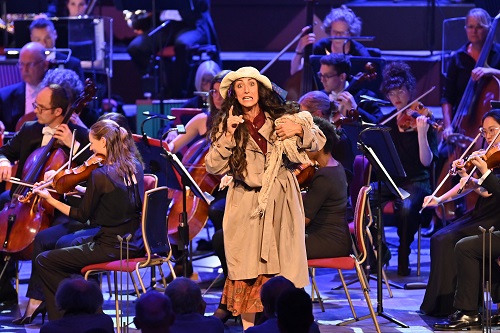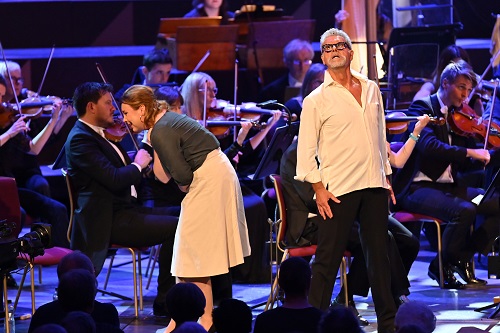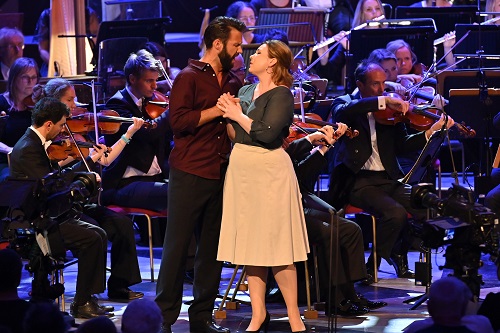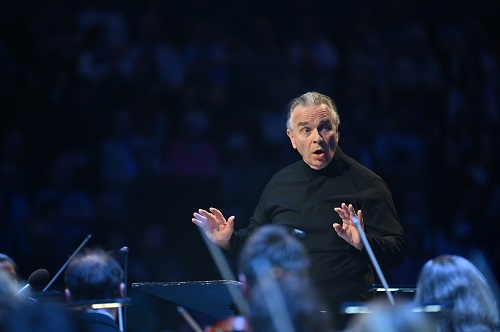A barge is moored along a wharf on the Seine River, the sluggish flow of which is a hard-working metaphor in Puccini’s one-act Il tabarro (The cloak) – for the weariness of the lives of the bargemen and stevedores whose livelihood depends upon its listless currents; and for the tears and anguish of the protagonists whose suffering and sorrows are as deep as those silent waters. Puccini’s Il tabarro smoulders with languid bitterness and resentments which hopelessness magnifies and energises into violent, tragic passions. In this Proms performance by Sir Mark Elder and the Hallé – billed as a ‘concert performance’ but sung off-score and with more dramatic impact than one often encounters in the opera house – the cruelty of fate and the bleakness of fulfilment denied were communicated with almost painful intensity.
Both the ambience of river life and the soul-destroying nature of such an existence were established by Elder in the opening scenes, the murky orchestral colours communicating the gloomy fatigue of the river even while the ‘river theme’ hinted at its underlying, unstoppable power. Alasdair Elliott and Simon Shibambu deftly characterised the stevadores Tinca and Talpa respectively; Annunziata Vestri was a characterful La Frugola, relishing the grotesqueness of the rag-picker while exploiting the generosity of the melodies with which Puccini brings her to life. Vignettes such as the Ballad-Peddlar’s ‘Primavera’ – sung with nostalgic lyricism by Shengzhi Ren – alleviated the melancholy even as the song’s story of Mimì, ‘Chi ha vissuto per amore, per amore sì morì’, foreshadows the miserable destiny of those who live for love, and will die for love. Laura Lolita Perešivana and Ryan Vaughan Davies were characterful and sympathetic young lovers, a welcome counterpoise to the opera’s dark energies.

In the latter part of the opera, the love triangle which will explode in a crime of passion moved to the foreground. The fuse within Lucio Gallo’s brooding Michele grew ever shorter, the flames of inner anguish fuelled by ominous introspection and caustic jealousy. When Michele’s explosive catharsis came it was terrifyingly intense. ‘Perchè, perchè non m’ami più?’ Gallo implored of Natalya Romaniw’s Giorgetta, with pained desperation, a man deluded by the hope of love reborn. Singing with focused power and impact, the Italian baritone conveyed Michele’s torment in a way which garnered sympathy even as one withdrew from his violent intent. The torments of aging, and of desire denied, were upsettingly real. Michele’s closing monologue, ‘Scorri, fiume eterno!’ (‘Flow, eternal river!’) surged with a force equal to the destructive river it addresses, culminating in a terrible cry of desolation, ‘La pace è nella la morte!’ (‘Peace exists only in death!’)

Tenor Adam Smith worked tirelessly – both musically and dramatically – to convey Luigi’s thwarted passion and subsequent despair. Even when he was a little pushed at the top, Smith sang with declamatory force and strong bearing. Luigi’s volatility was palpable, personal and political injustices woven into his soul. His reminiscences of life in his hometown of Belleville inspired empathetic intensity from Romaniw’s wilful yet wretched Giorgetta, the Welsh soprano singing with characteristic lustre, velvety depth and persuasive feeling. Elder, always sympathetic to the cast, plundered the extremes of Puccini’s atmospheric score.

The Hallé exchanged woebegone wharves for sparkling fountains earlier in the evening, presenting a mesmerisingly evocative account of the first part of Respighi’s Roman trilogy, Fountains of Rome (1916). This was highly detailed playing of tremendous sensitivity and insight – all wispy scents, tactile sensations and textures both gossamer and noble. ‘The Fountain of Valle Giulia at Dawn’ was dreamily hazy, soft woodwind solos emerging from the misty morning meanderings of the second violins above harmonics and pedals which awoke to a refreshing dawn, as the solo cello melody stretched its limbs, and harp and flute glinted in the tremolando strings’ morning light. The definition sharpened in the brightness of ‘The Triton Fountain in the Morning’, triangle and celeste twinkling with an eye-piercing gleam, harp and piano glissandi exploding exuberantly – water pyrotechnics in sound. ‘The Trevi Fountain at Noon’ cascaded powerfully, brass and timpani brilliant in the mid-day heat, the interlocking string runs a seamless stream. This was a glorious wash of sound – the surging, mythic sweep of the eternal city. Elder’s command of the ebb and flow of ‘The Villa Medici Fountain at Sunset’ was masterful. Here was a melancholic beauty, fragments and flutterings anticipating the bells tolling for Angelus, before the pianissimo perfume faded into the dusk. An irresistible invitation to shut one’s eyes and imagine.

The Prom began not with cascading fountains but with a near-flood of biblical proportions. A merciless self-critic, Paul Dukas destroyed most of his compositions, leaving behind only a handful of major works. Thanks to Walt Disney, his youthful musical animation of Goethe’s ballad, Die Zauberlehrling, has become his signature work. There was no twee saccharinity here, though. Elder left us in no doubt that The Sorcerer’s Apprentice (1897) is a cautionary tale, a warning against ignorance, presumption and pride. The Hallé’s performance served the narrative superbly, rhythms, motifs and accents shaped with an ironic lilt. ‘Once upon a time …’ the oboes’ and clarinets’ coyly climbing opening motifs seemed to say, as the orchestra held its collective breath, harp and pizzicato strings delicately winding up the momentum, the barely-there quavers of the double bassoon, horns and timpani teasingly tense.
A nonchalant but knowing bassoon got the story underway, Elder’s judicious tempo allowing the clearly defined woodwind colours to capture the carefree cockiness of the Apprentice. The strings’ legato elaboration of the theme conveyed his growing pride, before their staccatos took on a darker edge, the orchestral accelerando pushing forward with tragic inevitability, the gruff double bassoon grinding home the Apprentice’s hubris, and angry stamps and driving imitation making an apocalypse seem imminent. Elder summoned a near-hysterical swirl of sorcery as the renewed broom-halves went about their wicked mischief, torrents of water threatening to drown the whole house. A brass blare and crashing bass drum signalled the furious, but fortunate, return of the Sorcerer as the meekly sliding clarinet hung its head in shame. The pathos was palpable, the final judgement damning – pride goes before a fall, indeed.
Claire Seymour
Prom 19: Dukas – The Sorcerer’s Apprentice, Respighi – Fountains of Rome, Puccini – Il tabarro
Michele – Lucio Gallo, Giorgetta – Natalya Romaniw, Luigi – Adam Smith, La Frugola – Annunziata Vestri, Tinca – Alasdair Elliott, Talpa – Simon Shibambu, Ballad-Seller – Shengzhi Ren, lover – Laura Lolita Perešivana, lover – Ryan Vaughan Davies, Philharmonia Voices, Hallé Orchestra, Sir Mark Elder (conductor)
Royal Albert Hall, London; Saturday 30th July 2022.
ABOVE: Lucio Gallo (Michele), Adam Smith (Luigi) (c) Chris Christodoulou/BBC